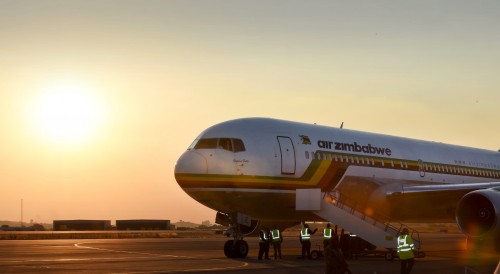Can Air Zimbabwe take off again?
The administrators of Air Zimbabwe handed control of the business back to management on Thursday with a robust and promising six-year strategic plan most likely to see the state–owned airline reclaim its status as a preferred local and regional carrier.
While coronavirus remains a biggest challenge to most airlines, the ongoing vaccination programmes are a huge boost to air travel industry, which had been brought to its knees due to travel restrictions.
Government appointed Grant Thornton’s Reggie Saruchera and Tonderai Mukubvu as co-administrators to run its loss-making national airline in October 2018 in a bid to revive its economic fortunes.
Some strategic milestones have been achieved, which averted the collapse of the national flag carrier and the Government has expressed gratitude to ” legacy of hard work and honest left by the administrators.”
The key milestones include recovery of assets bought by the Government between 2016 and 2017-an Embraer aircraft and two Boeing 777-200ER aircraft.
The administrators also operationalised Boeing 737-200 (regional and charters), Embraer 145 (domestic and regional) and Boeing 767-200ER (commercial charters).
Financial records were updated and brought audited financial statements to date from 2012 to 2019.
Internal controls were enhanced to ensure sustainable operations during reconstruction including recovery of some debts.
The administrators also entered a compromise arrangement with stakeholders, which resulted in settling in full all validated and proven local creditors.
They also come up with a scheme of reconstruction to pay foreign creditors over three years and rationalisation of staff from 647 to 82 permanent and 86 contract employees.
The balance sheet was restructured from a negative equity of US$305 million to a positive equity of US$80 million.
Equally critical, the administrators developed a six-year strategic turnaround business plan that will be implemented in two phases.
This week, the Government appointed a new board led by Andrew Bvumbe to oversee the implementation of the strategic plan.
During the first four years, the administrators proposed the development of Harare as a regional hub to support regional and international travel, an advantage currently enjoyed by Johannesburg in South Africa.
They proposed usage of cost effective smaller aircrafts-two Embraer 50 seater and two Boeing 100 seater at increased frequency, targeting most profitable routes–domestic and regional and this is expected to give Air Zimbabwe an edge over rivals.
For instance, it is proposed that Air Zimbabwe fly at least five times a day to Johannesburg using low costs aircraft.
Once Harare is developed as a regional hub, Air Zim may resume international flights using its long-haul aircraft.
At the moment, it is uneconomic to fly big aircraft locally or regionally since they are not designed for short trips like Harare–Johannesburg or Harare– Bulawayo. The minimum flying hours have to be around eight for the bigger aircraft to be cost effective.
It has been proposed that Victoria Falls be developed as a tourism hub to support local tourism.
On the supporting infrastructure, it is proposed that domestic runways at Buffalo Range, Gweru, Masvingo, Kariba, and Mutare be expanded to have a length of 2km and 30 metres to accommodate expansion of domestic tourism destinations.
Speaking at the occasion to unveil the new board, Transport and Infrastructure Development Minister Felix Mhona, urged the board to oversee the finalisation and implementation of the Air Zimbabwe’s business plan as approved by Cabinet.
“I want to take this opportunity to express the confidence that Government has in the interim board as it embarks on a journey to carry on of hard work and honest left by the administrators,” said the Minister.
The interim board is also expected to finalise the production of audited accounts for the airline, instil a high standard of corporate governance and ensure adherence to the schedules by the airline despite limited resources.
The other interim board members are head of Public Sector Investment Programme in the Ministry of Finance and Economic Development Pfungwa Kunaka and Zimbabwe Tourism Authority acting chief executive Mr Givemore Chidzidzi.
Chief director public procurement and disposal of public assets in the Corporate Governance Unit in the Office of the President and Cabinet Dr Michael Musanzwika and deputy director — strategic policy planning in the Ministry of Transport and Infrastructural Development Nyikadzino Chifema are the other members.
Improved air connectivity is critical to Zimbabwe at a time the southern Africa country is on the drive to attract foreign direct investment as well as enhance tourist arrivals. -ebusinessweekly.c.zw










